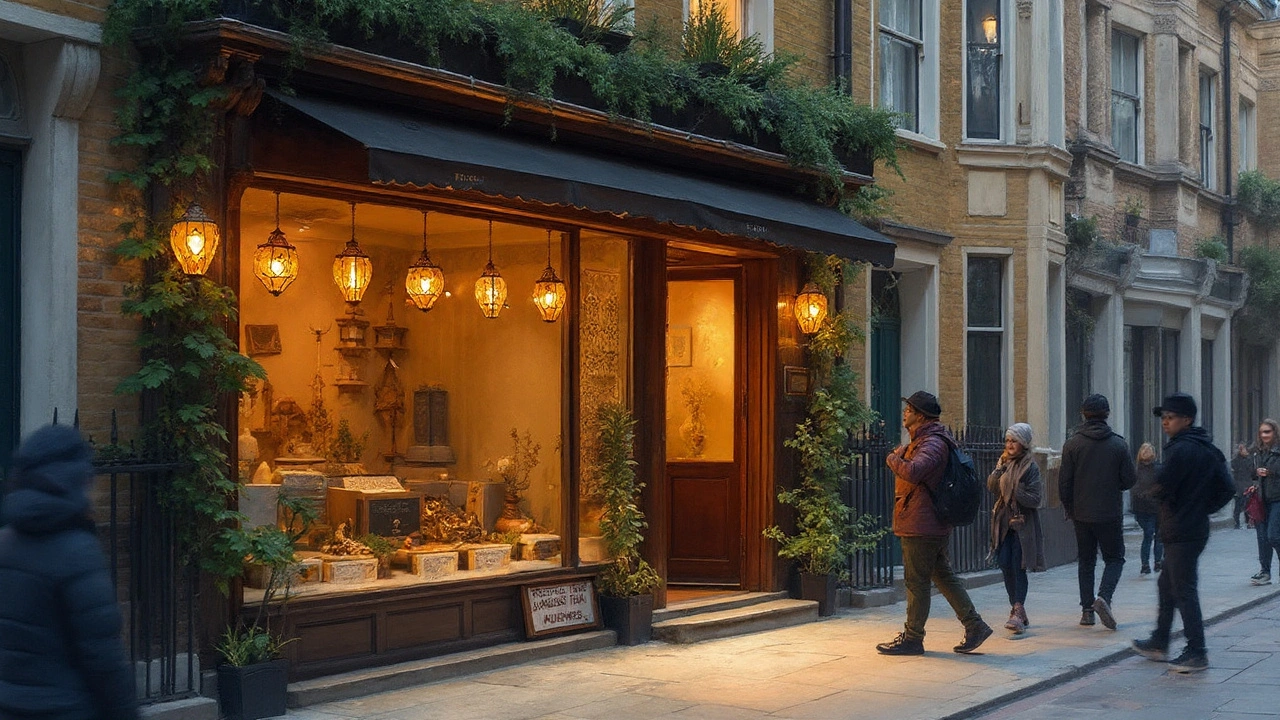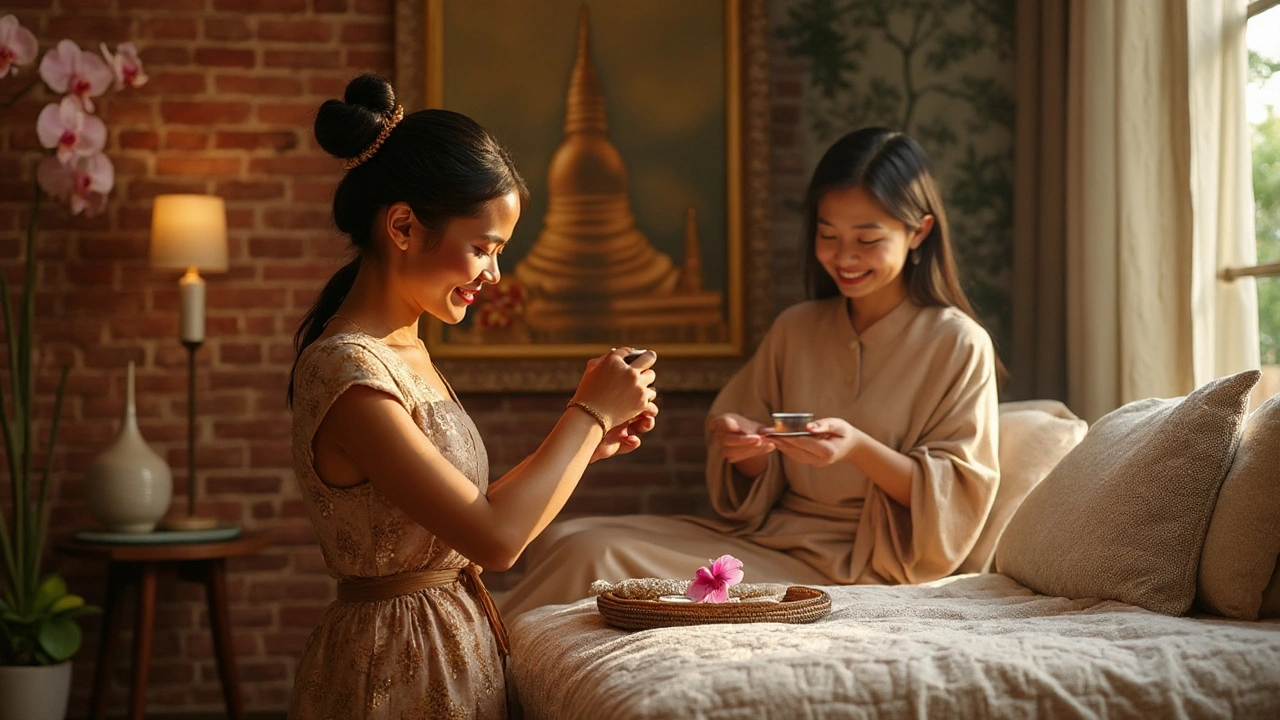Feeling stiff or burned out? Regular massage sessions near you are more than just a treat—they can boost your mood, cut stress, and even help with pain relief. This guide breaks down the real-life benefits of booking a local massage, what to expect, and how to choose the right service. You'll also find tips for keeping your sessions safe and affordable. Ready to upgrade your self-care routine?

- Created by: Elara Wainwright
- Completed on: 4 Aug 2025
- Categories: Thai Massage
Ever wondered why some wellness practices never go out of style, even as trends come and go? Enter Thai massage—a healing tradition that’s been passed down for centuries and is somehow more popular than ever in 2025. In a city like London, where everyone’s forever on the move, the slow, steady rhythm of a Thai massage session feels almost rebellious. If you’ve passed by a Thai massage clinic and thought, “Could it really make a difference?”—you’re not alone. Let’s peek beneath the towel and see why this timeless ritual keeps winning over stressed-out city dwellers hoping for something a little more profound than a quick back rub.
What Is Thai Massage and Why Does It Matter?
Imagine a wellness tradition so deeply respected in its homeland that it’s officially listed as UNESCO Intangible Cultural Heritage. That’s Thai massage—called "Nuad Thai" in Thailand. Unlike what you might expect from a standard spa treatment, Thai massage is a blend of acupressure, assisted yoga stretches, energy line work, and mindful breathing. Think of it as a fusion: part therapeutic stretch, part guided meditation, and definitely not your average oil-filled back massage session.
Thai massage dates back over 2,500 years, credited to Shivago Komarpaj, a physician linked with Gautama Buddha. Modern research backs up its ancient pedigree. In 2018, a study published in the Journal of Bodywork and Movement Therapies showed a single session could reduce back pain and tension as effectively as physical therapy. Not bad for something that predates electricity, right?
The session usually takes place on a padded mat instead of a table. No oils or lotions needed, so you get to keep your clothes on—hello comfort! Your therapist uses their hands, thumbs, elbows, knees, and even feet to guide your limbs through gentle stretches and rhythmic compressions. The idea? To unstuck the body’s energy (known as "Sen" lines), boost circulation, and help you feel revived, both inside and out.
But why does this matter in today’s world? Stress, sedentary jobs, and digital overload do a number on our posture, mood, and mobility. Thai massage isn’t just a luxury. It’s a way to reset the nervous system, address knotted muscles, and connect body and mind in ways most modern treatments overlook. Even better, it’s deeply rooted in holistic health—treating everything from headaches and insomnia to strains and low mood.
And no, you don’t have to be double-jointed or particularly flexible. The therapist customizes each move for your comfort and ability, so it’s perfectly safe and accessible for all ages and body types. Temples, monks, and even hospitals in Thailand have long used this technique for healing and prevention, so there’s plenty of wisdom – and evidence – behind it all. Now, with London’s Thai massage community growing each year, modern city dwellers can plug straight into that legacy.

All the Ways Thai Massage Benefits Your Body and Mind
So, is Thai massage just a fancy stretch, or is there more going on? The effects honestly go way deeper than most people expect. Let’s break down the standout benefits – the ones backed either by tradition or by the latest research-based findings, and yes, stories from real people who rave about its impact.
Physical Benefits:
- Thai massage is a powerhouse for easing muscle tension. Hurt after a long workweek? Tight shoulders from hours hunched over a laptop? This massage helps break up deep knots without the intense pain you sometimes get from deep tissue techniques.
- Better flexibility and range of motion. The gentle, yoga-inspired stretches work out stiffness. If you struggle with yoga poses because your hamstrings feel glued together, regular sessions loosen things up—without making you sweat like you’re in a hot yoga studio.
- Boosts blood flow and lymphatic circulation. This improves healing and helps your body flush out metabolic waste, so you’re less likely to feel sluggish or puffy. Studies show that just one session can lower markers of inflammation in the blood.
- Relief from chronic pain and specific issues—like migraines, sciatica, or plantar fasciitis. Therapists work on energy lines and trigger points, which can be especially useful for runners or people stuck at a desk all day. Anecdotally, many London office workers find that Thai massage helps them avoid reaching for painkillers just to get through the week.
Mental and Emotional Perks:
- Reduces stress and calms anxiety. The slow, rhythmic pace and the focus on breath work help regulate your nervous system, lowering cortisol (the stress hormone). If you’ve ever left a treatment room and felt like you were in a daze or blissfully spaced out, that’s the magic at work.
- Helps with sleep quality. Lots of clients say they drift off more easily—and wake up less often—after a session, thanks in part to the deep relaxation response this massage activates.
- Cuts through mental fog. Some evidence suggests that by stimulating certain points, Thai massage can sharpen focus and leave you feeling alert but not wired—a perfect combo for busy people facing constant deadlines.
- Encourages mindfulness. Since your therapist asks you to focus on breathing and bodily sensations, it’s easy to slip into a meditative headspace. This is especially helpful if you struggle to meditate solo or find your mind wandering during yoga.
Social and Cultural Value:
- It’s an expression of care and respect—something you’ll feel right away in the kindness of your therapist. In Thailand, Nuad Thai is as much about healing human connection as physical results.
- The shared room style (sometimes called "community massage") is actually normal there—so friends, couples, and even parents and children sometimes book sessions together. In London, private sessions are the norm for privacy, but some places offer rooms for two, perfect for partners wanting to de-stress side by side.
Quick tip: If you’re new to Thai massage, don’t just try one session and be done. Like learning a language or building strength, regular sessions deliver the best results. Most people notice the biggest benefits after about 4-6 weekly treatments—especially for persistent aches or stress.

Different Styles of Thai Massage in London, How to Book—and What to Expect When You Arrive
In a melting pot city like London, the Thai massage scene is as diverse as the eat-out options on Brick Lane. There are specialist clinics in Soho, Mayfair, Camden, and even tucked away in places like Shoreditch or Richmond. Whether you’re after a strictly traditional experience or a modern spin, the city’s got you covered. Here’s what you’ll find:
- Traditional Thai Massage: This is the classic style as practiced in Thailand, focusing on stretches, acupressure, and breath work. Perfect if you want the real deal—no oils, full clothing, and a focus on whole-body healing.
- Thai Oil Massage: A Western twist that blends Thai technique with Swedish strokes and essential oils. Think of it as the best of both worlds: muscle work plus a bit of spa-style pampering. Great if you prefer the glide of oil and want more focus on relaxation.
- Thai Foot Massage (Reflexology): Focusing on the feet, calves, and lower legs using acupressure and stretching. People with foot pain, runners, or anyone on their feet all day swear by this. Many Londoners try this first as an intro to Thai massage.
- Herbal Compress Thai Massage: Warm herbal pouches soaked in steam are pressed along your body’s key points. It’s aromatic, warming, and really helps detox tired muscles. This is especially soothing in winter when your joints feel stiff.
- Fusion Styles: Many clinics offer combos—mixing Thai, hot stone, or even deep tissue massage. If you want something tailored, don’t hesitate to ask when you book.
How do you find a great Thai massage near you? Go for word of mouth or check real reviews (not just star ratings). Look out for places with therapists who are either Thai nationals or have trained in Thailand—many proudly mention their credentials. Membership bodies like the Thai Healing Alliance or UK Guild of Holistic Therapists list reputable clinics too.
Don’t forget to check for specializations: Some therapists are better with sports recovery, while others focus on elderly care or pregnancy-safe Thai massage. Many clinics have websites showing their menu, therapist profiles, and sometimes even virtual tours of the space.
Ready to book? Most places now have online booking and instant confirmation—super handy. You’ll generally be offered a choice of session lengths (30, 60, 90, or 120 minutes). For a genuine experience, don’t rush—give yourself at least an hour so the therapist can work the full body. Prices in London vary, but you’re looking at roughly £50-£80 per hour, with swish West End spas sometimes charging more. Keep an eye out for new client discounts or packages if you’re planning regular sessions.
When you show up, expect a quiet, welcoming vibe and a quick chat with your therapist about your health, pain, and comfort levels. You’ll be offered loose clothes to wear (think pyjamas, not robes), then led to a warm, softly lit room. There’s usually no music—just gentle sounds or silence, allowing you to really drop into the experience. Don’t worry about awkward small talk; just let your therapist know if anything feels too intense or too gentle. Communication is key.
You may feel a little stretchy afterwards, but not sore. Drink plenty of water and try not to rush right back into the rat race—your body will want to soak up all that calm. And if you’re booking a treat for two, just ask for a double room and they’ll set you up side by side. Easy.
Want to weigh up your options? Here’s a handy side-by-side for Thai massage versus Swedish massage—the other city favorite:
| Feature | Thai Massage | Swedish Massage |
|---|---|---|
| Technique | Stretching, acupressure, energy line work | Effleurage, kneading, long strokes |
| Clothing | On; loose clothes provided | Off or underwear; covered by towels |
| Oils/Lotions | None (unless requested Thai oil style) | Always used |
| Benefits | Flexibility, posture, energy, relaxation | Muscle relief, relaxation, stress reduction |
| Experience | Active (therapist moves your body) | Passive (you lie still) |
Not sure which fits you best? Try each, then go with what your body (and mind) need most.
Still have questions swirling around? Here’s a quick hit-list of FAQs to keep everything clear:
- Will Thai massage hurt? Not if done correctly. There might be deep pressure and stretches, but always speak up if it’s too much.
- How often should I go? Once a week to start if you’re tackling a specific problem, or monthly for maintenance.
- What should I bring? Just yourself. Wear comfy clothes or use what’s provided. No fancy prep needed.
- Can pregnant people get Thai massage? Yes, but only with a skilled, pregnancy-trained therapist. Mention it when booking.
- Do I tip? Tipping is appreciated, usually 10-15%, though not mandatory—totally your call.
- Is it safe for everyone? Mostly, yes. If you have serious health conditions, check with your GP first and let your therapist know.
Safety-wise, never ignore your limits—if a stretch or move triggers pain (not just a little tension), flag it. Choose clinics that prioritize hygiene, and steer clear of any that seem shady or don’t provide qualifications on request. Real Thai massage is about healing, not shortcuts or gimmicks.
Ready to give your stress a run for its money? Whether you want to banish tension knots, boost your mood, or just take a well-earned pause, Thai massage in London bridges tradition and modern need like little else. Why not experience a piece of living legend and discover why so many locals are hooked? Trust me, your future self will thank you.
Lymphatic drainage massage could be your secret weapon in boosting your immune system, reducing swelling, and enhancing well-being. This specialized technique helps your body get rid of toxins and improves circulation. Discover how a few sessions can aid in relaxation and overall health without any complex procedures. Whether you’re dealing with bloating or just want to feel a bit lighter, this massage could be just the ticket.
Discover how foot massage can help with more than just tired feet. This article explains how simple foot massages unlock real health benefits like better sleep, improved mood, faster recovery after long days, and even pain relief. Learn about what kinds of foot massages exist, how to find good local therapists, and practical tips to get the most out of your session. If you’ve ever wondered whether foot massage is worth it, you’ll find clear, honest answers here.




Bhatti Naishadh
August 4, 2025 AT 15:10Thai massage in London is an intriguing blend of East meets West wellness. The ancient roots of this therapy carry a philosophical depth many overlook.
It’s not just a massage; it’s a practice connecting body and spirit. Yet, modern fad seekers often miss its true essence.
Booking safely means knowing the authentic centers, not the flashy fronts. Prices vary, but value lies in tradition, not luxury.
One must be discerning and patient, as real healing takes time and respect. It is a path worth walking for those who seek genuine relief in this modern city maze.
Bruce Monroe
August 5, 2025 AT 15:20Thank you for sharing this informative post about Thai massage in London. It is imperative to acknowledge the therapeutic benefits of such ancient healing modalities in today’s hectic urban environment.
Authentic Thai massage encompasses a range of techniques aimed at releasing muscle tension and improving circulation. When selecting a service provider, it is crucial to verify credentials and hygiene standards to ensure a safe and beneficial experience.
Moreover, the pricing structure typically reflects the duration and expertise involved, so potential clients should be prepared for some variability. Overall, integrating traditional therapies like Thai massage can profoundly enhance wellness in metropolitan contexts.
Pierce Burbank
August 9, 2025 AT 02:40Wow!! This post nails it on so many levels!!!
When I first tried Thai massage in London, I was blown away by how effective and relaxing it was!!! Seriously, the combination of stretches and pressure points is amazing for anyone carrying stress around!!
For anyone looking to try, DO make sure you pick a place that’s reputable—word of mouth and online reviews can be super helpful!!!
Also, ask about the types: traditional or oil massage. Knowing what to expect takes away the jitters and maximizes your chill time!!!
Highly recommended for city dwellers needing to reset and recharge!!!
Janet Rohrer
August 10, 2025 AT 06:26Hold on, are we sure all these massage places in London are legit? It feels like with rising health trends comes a ton of dubious setups capitalizing on hype.
It's essential to stay alert about who is practicing — some places might just be fronts with little to no real expertise.
People need to do thorough homework, check licenses, and maybe even ask for certifications directly before booking.
Don't just jump because it looks pretty or sounds exotic; your health deserves authentic care, not a gamble.
Transparency and safety shouldn’t be optional in wellness services.
Lisa Grant
August 11, 2025 AT 10:13This article is an exciting gateway for anyone in London looking to boost their wellness! Thai massage has sooo many benefits beyond just feeling good—think improved circulation, better flexibility, and stress relief.
What really stands out is how it caters to all kinds of people—whether you want a deep therapeutic session or a gentle unwind.
If you’re new, just remember to communicate openly with your therapist about your needs and any ailments.
Also, squeezed in some tips here: always go for places with trained therapists and don’t forget to check the vibe before committing!
Get ready to feel amazing!!
Jimoh Tajuddeen T
August 15, 2025 AT 00:20Honestly, all these posts about Thai massage make me think some people are just jumping on the wellness bandwagon without real care for authentic healing.
Wellness is a serious thing; it’s not just a luxury or trend. You gotta respect the roots and history behind it, not just get a quick fix.
City life wears you down, sure, but taking shortcuts won’t do the job long-term.
And if you’re booking, be mindful of who you trust—push past the pretty ads and find someone worthy of your body and mind.
Otherwise, you’re feeding into a market that dilutes what real healing means.
Becky Voth
August 19, 2025 AT 12:40Love this post, SO informative!! I just wanted to add that when booking a Thai massage, it's super important to ask if the therapist is certified by a recognized Thai massage school.
This can save you from a lot of discomfort or disappointment.
Sometimes, places offer cheaper prices but at the expense of quality.
Also, the type of massage makes a big difference—some are more intense, while others are gentle and relaxing.
And don’t forget to hydrate well after your session!!! It really helps the body heal and flush out toxins.
Alex Burns
August 22, 2025 AT 10:06Hmm, about the prices—does anyone know what the average cost range is for an authentic Thai massage in central London? I’m curious because London tends to have pricey wellness options.
Also, do all places offer variations depending on length or style? That info would be really useful for budgeting.
Finally, does anyone have tips to distinguish an authentic practitioner from a generic spa therapist?
Thanks in advance! Planning to try a session but wanna make the most informed choice possible.
Debasish Maulik
August 27, 2025 AT 15:06It's fascinating how ancient healing traditions like Thai massage adapt to modern urban settings such as London.
The interplay of shifting our bodily tensions and aligning with deeper energy flows offers more than physical relief; it sparks a reflective experience on how we maintain wellness amidst city chaos.
I believe embracing these practices can cultivate mindfulness as well as health.
However, this requires openness and respect for their cultural origins rather than superficial consumption.
It would be great if places in London included educational components about the heritage alongside the massage treatments to enrich the experience.
Triston Foo
September 2, 2025 AT 10:00Oh sure, because what every stressed out Londoner needs is a Thai massage, right? As if that’s some magic elixir for city woes!
But seriously, if you’re going to shell out money, make sure it’s legit and not just some walk-in spa with no clue what they’re doing.
Prices probably vary so wildly it’s like roulette; you either get a genuine session or a glorified rubdown.
Just keep your expectations reasonable and do a bit of research.
Otherwise, you might end up more stressed than when you started. Like, wellness isn’t one-size-fits-all, people!